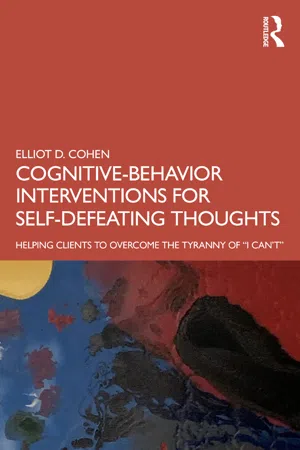
Cognitive Behavior Interventions for Self-Defeating Thoughts
Helping Clients Overcome the Tyranny of "I Can't"
Elliot D. Cohen
- 288 pages
- English
- ePUB (mobile friendly)
- Available on iOS & Android
Cognitive Behavior Interventions for Self-Defeating Thoughts
Helping Clients Overcome the Tyranny of "I Can't"
Elliot D. Cohen
About This Book
Integrating Cognitive Behavior Therapy (CBT) with a logic-based restructuring of Rational Emotive Behavioral Therapy (REBT), this book provides therapists with a guide for addressing self-defeating thoughts and behaviors.
Cohen explores how the tyrannical use of the words "I can't" creates and sustains many commonplace behavioral and emotional problems. It shows how cognition and affect are intimately connected, demonstrating how cognitive-behavioral interventions help clients to address both their feelings and irrational ideas. Each chapter explores a specific problem, including low frustration tolerance, obsessiveness, risk avoidance, phobias, intolerance to criticism, dependent personalities, and much more. The theories developed throughout are integrated with practice sections and session transcripts that focus on the application of these theories for the treatment of clients who have self-destructive linguistic habits. Cohen also provides resource materials including reflection activities, bibliotherapy, meditation, and step-by-step guidance.
This book is essential reading for mental health professionals looking for novel techniques of using CBT, life coaches, positive psychology coaches, counselors, and academic and clinical researchers who work with CBT.
Frequently asked questions
Information
Part I
1 Logic and Language
Self-Disturbing Speech Acts
I had finally … at least to my own satisfaction, solved the great mystery of why so many millions of human beings not only originally became emotionally disturbed, but why they persistently, in the face of so much self-handicapping, remained so. The very facility with language which enabled them to be essentially human—to talk to others and to talk to themselves—also enabled them to abuse this facility by talking utter nonsense to themselves: to define things as terrible when, at worst, these things were inconvenient and annoying. (p. 21; emphasis in original)
Misery … consists of two fairly distinct parts: (1) desiring, wishing, or preferring that you achieve some goal or purpose and feeling disappointed and irritated when you do not achieve it; and (2) demanding, insisting, commanding, and urgently necessitating that you achieve this goal or purpose and feeling bitter, enraged, anxious, despairing, and self-downing when you do not. (p. 77)
| Type of Demanding Perfection | Definition | Example |
|---|---|---|
Outcome Certainty | Demanding certainty about the outcomes of one’s actions. | “I must be certain I won’t fail.” |
Existential Certainty | Demanding certainty that bad things won’t happen to oneself or one’s loved ones. | “I must always be certain that bad things won’t happen.” |
Moral Certainty | Demanding certainty that one won’t do (morally) bad things. | “I must be certain I won’t do something wrong.” |
Treatment | Demanding that others always treat one fairly. | “Others should never deceive me.” |
Existential | Demanding that the world not contain bad things. | “Bad things like pandemics should never happen.” |
Performance | Demanding that one not make mistakes that could reflect badly on what others may think.a | “I must not fail to do what is expected of me.” |
Hedonic | Demanding immediate (or fast) gratification. | “I must get what I want immediately.” |
Epistemic | Demanding that reality be just what one says it is. | “I must always be right.” |
Approval | Demanding the affection, confidence, or approval of others as a condition of one’s own self-worth. | “I must always get the approval of others.” |
Table of contents
- Cover
- Half Title
- Title Page
- Copyright Page
- Dedication
- Contents
- Preface
- Acknowledgments
- Introduction
- PART I: Overcoming “I Can’t” in Self-Defeating Reasoning: A Logic-Based Cognitive-Behavioral Approach
- PART II: Neurological Correlates
- PART III: Overcoming Common Types of Capacity Disavowal
- Index